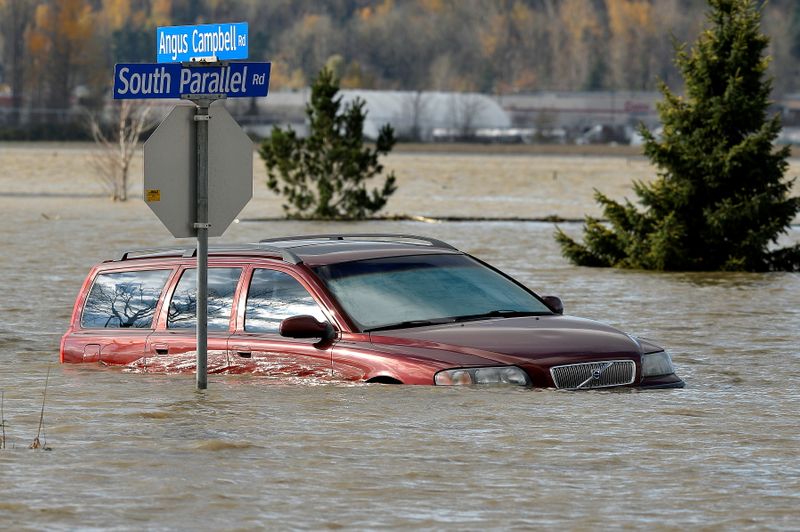
Quite simply, the lower mainland and the BC interior got hit with an athmospheric river that dumped eight inches in a single day in the interior plateau. All this water must now work its way through the Fraser Canyon to reach the lower mainland.
The water shed is 240,000 square kilometers. Compare to all of texas at 690,000 square kilometers and it is still a quarter of the srea of BC. Few folks truly grasp just how huge BC happens to be.
All this water must how come into the so called lower mainland while also melting a lot od recent snowfall. And of course it must all pass through a single choke point around Hope BC along with the main highways and our two main rail lines. It all got wrecked and badly also. The Fraser river moved over and chewed out a stretch of hte Trans Canada Highway. The main route down the coquihalla has seen a huge bridge utterly destroyed and the river bed re done. Temporary bridges look difficult here.
At the same time the altertnate route in the fraser canyon has been cut on the thompson as well. That leaves possible traffic through princton and it all still goes thfrough Hope and major repairs are all needed there.
So far it appears we can bring stuff in over the USA border via the freeways through Spokane and Seattle so the city is not totally cut off, but the main corridor is wrecked for a long time and any temporary fixes look as difficult as doing a full on build.
On the otherhand this is a very rare event. We may even be able to build outside of the damage channels though i doubt that. We cannot be that lucky on transport corridors stuffed between cliffs...
Canada floods cut rail link to Vancouver port; one dead
By Artur Gajda and Rod Nickel
0commentsPosted on November 17, 2021
Rainstorms cause flooding and landslides in the western Canadian province of British Columbia
FacebookTwitterMore
https://www.metro.us/canada-floods-cut-rail/
MERRITT, British Columbia (Reuters) -Floods and landslides that have killed at least one person have cut all rail access to Canada’s largest port in the city of Vancouver, a spokesperson for the port said on Tuesday.
Two days of torrential rain across the Pacific province of British Columbia touched off major flooding and shut rail routes operated by Canadian Pacific Rail and Canadian National Railway, Canada’s two biggest rail companies.
“All rail service coming to and from the Port of Vancouver is halted because of flooding in the British Columbia interior,” port spokesperson Matti Polychronis said.
At least one person was killed when a mudslide swept cars off Highway 99 near Pemberton, some 100 miles (160 km) to the northeast of Vancouver.
Two people were missing and search and rescue crews were combing through the rubble, officials said.
Vancouver’s port moves C$550 million ($440 million) worth of cargo a day, ranging from automobiles and finished goods to essential commodities.
The floods temporarily shut down much of the movement of wheat and canola from Canada, one of the world’s biggest grain exporters, during a busy time for trains to haul grain to the port following the harvest.
Drought has sharply reduced the size of Canada’s crops this year, meaning a rail disruption of a few days may not create a significant backlog, a grain industry source told Reuters.
Del Dosdall, senior export manager at grain handler Parrish & Heimbecker, said he expected some rail services could be restored by the weekend. Another industry source said he expected the shutdown to last weeks.
OIL PIPELINES SHUT DOWN
Floods have also hampered pipelines. Enbridge Inc shut a segment of a British Columbia natural gas pipeline as a precaution.
The storms also forced the closure of the Trans Mountain pipeline, which carries up to 300,000 barrels per day of crude oil from Alberta province to the Pacific coast.
Copper and coal miner Teck Resources Limited said the floods had disrupted movement of its commodities to its export terminals, while potash exporter Canpotex Ltd said it was looking for alternatives to move the crop nutrient overseas.
Directly to the south of British Columbia, in the U.S. state of Washington, heavy rain forced evacuations and cut off electricity for more than 150,000 households on Monday.
The U.S. National Weather Service on Tuesday issued a flash flood in Mount Vernon, Washington, “due to the potential for a levee failure.”
Some areas of British Columbia received 8 inches (20 cm) of rain on Sunday, the amount that usually falls in a month.
Authorities in Merritt, some 120 miles (200 km) northeast of Vancouver, ordered all 8,000 citizens to leave on Monday as river waters rose quickly, but some were still trapped in their homes on Tuesday, said city spokesman Greg Lowis.
Snow blanketed the town on Tuesday and some cars could be seen floating in the flood waters up to 4 feet (1.22 m) deep.
The towns of Chilliwack and Abbotsford ordered partial evacuations.
https://twitter.com/city_abbotsford/status/1460813259661996041?s=12
Abbotsford also issued an emergency warning on Tuesday night, asking all residents to evacuate the Sumas Prairie region immediately as deteriorating conditions posed a significant threat to lives.
Rescuers equipped with diggers and body-sniffing dogs started clearing mounds of debris that have choked highways.
The landslides and floods come less than six months after a wildfires gutted an entire town in British Columbia as temperatures soared during a record-breaking heat dome, raising new worries about climate change.
(Reporting by Artur Gajda in Merritt and Rod Nickel in Winnipeg; additional reporting by David Ljunggren in Ottawa, Nia Williams in Calgary, Ismail Shakil in Bengaluru, Brad Brooks in Lubbock, Texas and Dan Whitcomb in Los Angeles, Maria Ponnezhath in Bengaluru; editing by Ed Osmond, Jonathan Oatis, Aurora Ellis and Sandra Maler)
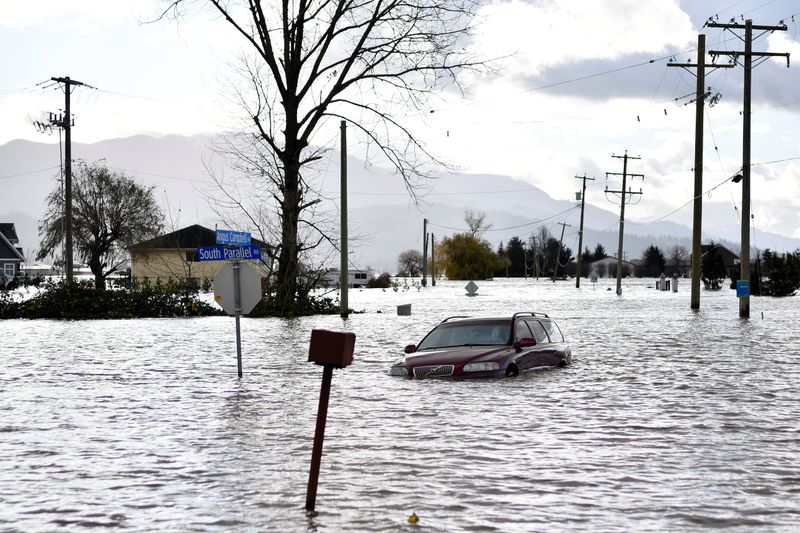
Canada floods cut rail link to Vancouver port; one dead
By Artur Gajda and Rod Nickel
0commentsPosted on November 17, 2021
Rainstorms cause flooding and landslides in the western Canadian province of British Columbia
FacebookTwitterMore
https://www.metro.us/canada-floods-cut-rail/
MERRITT, British Columbia (Reuters) -Floods and landslides that have killed at least one person have cut all rail access to Canada’s largest port in the city of Vancouver, a spokesperson for the port said on Tuesday.
Two days of torrential rain across the Pacific province of British Columbia touched off major flooding and shut rail routes operated by Canadian Pacific Rail and Canadian National Railway, Canada’s two biggest rail companies.
“All rail service coming to and from the Port of Vancouver is halted because of flooding in the British Columbia interior,” port spokesperson Matti Polychronis said.
At least one person was killed when a mudslide swept cars off Highway 99 near Pemberton, some 100 miles (160 km) to the northeast of Vancouver.
Two people were missing and search and rescue crews were combing through the rubble, officials said.
Vancouver’s port moves C$550 million ($440 million) worth of cargo a day, ranging from automobiles and finished goods to essential commodities.
The floods temporarily shut down much of the movement of wheat and canola from Canada, one of the world’s biggest grain exporters, during a busy time for trains to haul grain to the port following the harvest.
Drought has sharply reduced the size of Canada’s crops this year, meaning a rail disruption of a few days may not create a significant backlog, a grain industry source told Reuters.
Del Dosdall, senior export manager at grain handler Parrish & Heimbecker, said he expected some rail services could be restored by the weekend. Another industry source said he expected the shutdown to last weeks.
OIL PIPELINES SHUT DOWN
Floods have also hampered pipelines. Enbridge Inc shut a segment of a British Columbia natural gas pipeline as a precaution.
The storms also forced the closure of the Trans Mountain pipeline, which carries up to 300,000 barrels per day of crude oil from Alberta province to the Pacific coast.
Copper and coal miner Teck Resources Limited said the floods had disrupted movement of its commodities to its export terminals, while potash exporter Canpotex Ltd said it was looking for alternatives to move the crop nutrient overseas.
Directly to the south of British Columbia, in the U.S. state of Washington, heavy rain forced evacuations and cut off electricity for more than 150,000 households on Monday.
The U.S. National Weather Service on Tuesday issued a flash flood in Mount Vernon, Washington, “due to the potential for a levee failure.”
Some areas of British Columbia received 8 inches (20 cm) of rain on Sunday, the amount that usually falls in a month.
Authorities in Merritt, some 120 miles (200 km) northeast of Vancouver, ordered all 8,000 citizens to leave on Monday as river waters rose quickly, but some were still trapped in their homes on Tuesday, said city spokesman Greg Lowis.
Snow blanketed the town on Tuesday and some cars could be seen floating in the flood waters up to 4 feet (1.22 m) deep.
The towns of Chilliwack and Abbotsford ordered partial evacuations.
https://twitter.com/city_abbotsford/status/1460813259661996041?s=12
Abbotsford also issued an emergency warning on Tuesday night, asking all residents to evacuate the Sumas Prairie region immediately as deteriorating conditions posed a significant threat to lives.
Rescuers equipped with diggers and body-sniffing dogs started clearing mounds of debris that have choked highways.
The landslides and floods come less than six months after a wildfires gutted an entire town in British Columbia as temperatures soared during a record-breaking heat dome, raising new worries about climate change.
(Reporting by Artur Gajda in Merritt and Rod Nickel in Winnipeg; additional reporting by David Ljunggren in Ottawa, Nia Williams in Calgary, Ismail Shakil in Bengaluru, Brad Brooks in Lubbock, Texas and Dan Whitcomb in Los Angeles, Maria Ponnezhath in Bengaluru; editing by Ed Osmond, Jonathan Oatis, Aurora Ellis and Sandra Maler)

Rainstorms cause flooding and landslides in the western Canadian province of British Columbia
RCAF rescue some of over 300 motorists stranded by mudslides in Agassiz
Rainstorms cause flooding and landslides in the western Canadian province of British Columbia
\
Rainstorms cause flooding and landslides in the western Canadian province of British Columbia
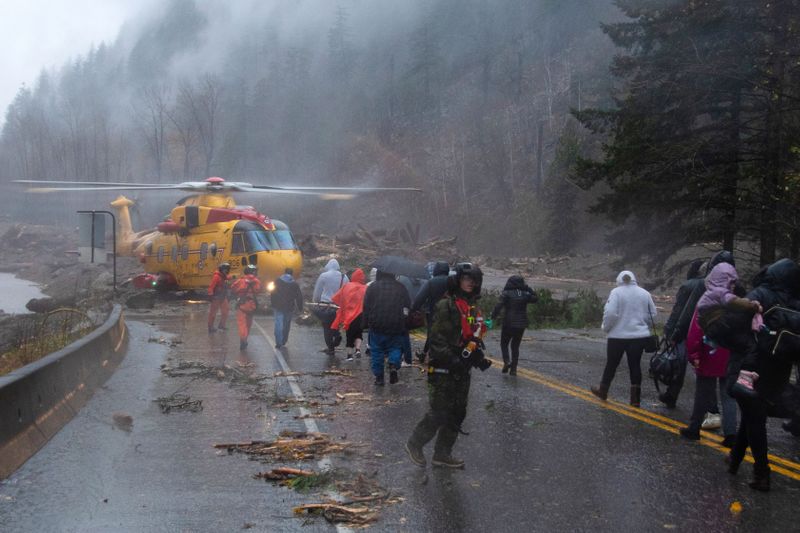
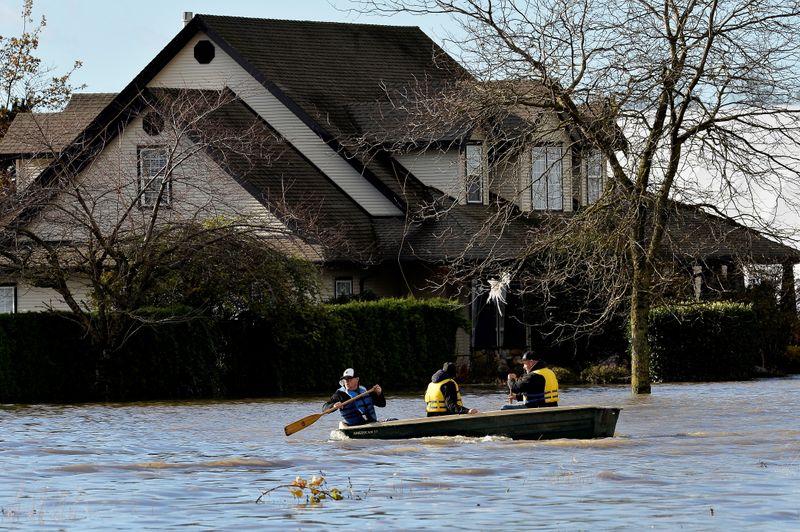
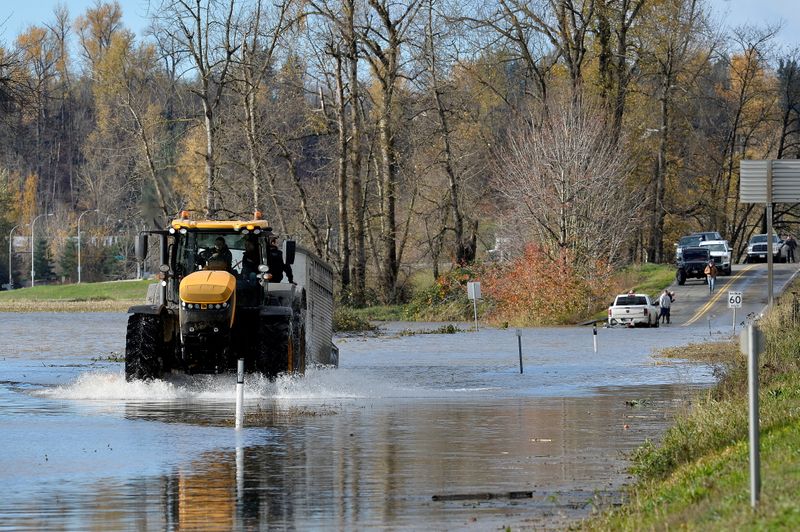
No comments:
Post a Comment